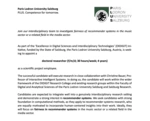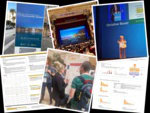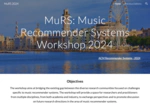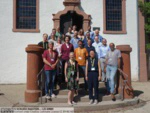Christine Bauer
Professor of
Interactive Intelligent Systems
Paris Lodron University Salzburg (PLUS), Austria
Profile
Christine Bauer is a Professor of Interactive Intelligent Systems at the Department of Artificial Intelligence and Human Interfaces (AIHI) at the Paris Lodron University Salzburg (PLUS), Austria, and a Co-Lead of the focus area InterMediation. Music—Effect—Analysis at the inter-university institution Wissenschaft & Kunst.
Her research activities center on interactive intelligent systems, whereby she integrates research on intelligent technologies, the interaction of humans with intelligent systems, and their interplay. She takes a human-centered computing approach, where technology follows humans’ and society’s needs. Recently, she has focused on context-aware recommender systems and concentrates on recommender systems in the music and media sectors in particular. Core interests in her research activities are fairness in algorithmic decision-making and multi-method evaluation.
She advocates equal opportunities, is a member of the working group on equal opportunities (AKG), and engages in initiatives such as Women in Music Information Retrieval (WiMIR), the Allyship program at CHI, and LEA (Let’s empower Austria).
- Interactive intelligent systems
- Recommender systems
- Fairness
- Applied AI
- Human-centered computing
- Multi-method evaluation
- Music recommender systems
- Context-adaptive systems
Doctoral degree in Social and Economic Sciences (Business Informatics), 2009
University of Vienna, Austria
MSc in Business Informatics, 2011
TU Wien, Austria
Diploma (equivalent to a Master's degree) in International Business Administration, 2002
University of Vienna, Austria
Study of Jazz Saxophone
Konservatorium der Stadt Wien, Austria
Portfolio
Interactive intelligent systems
at the intersection of human-centered computing, data science, and artificial intelligence
Elise Richter laureate (FWF)
6 best paper awards, 5 additional nominations
5 awards for reviewing activities, 6 special recognitions for outstanding reviews
30 different courses at 16 institutions
ESSIR, RecSys Summer School, PhD-AI.it
Tutorials at UMAP and ISMIR
Supervision of >70 theses
AE at TORS, TOIS, and JITT
Conf. Org. (e.g., RecSys, CHI, CIKM, ECIR)
Meta-Reviewer (e.g., SIGIR, RecSys, CHI, ISMIR)
Reviewer for >30 journals and >140 conferences
Workshop Organizer (e.g., PERSPECTIVES, Dagstuhl)
Repeatedly speaker and panelist at non-scientific events (e.g., Ars Electronica Festival, Dutch Media Week, VUT Indie Days)
Substantial media coverage (e.g., Financial Times, El País)
Radio interviews (e.g., Ö1, FM4, SWR 2, NPO Radio 1)
Research experience in 4 countries (AT, DE, NL, US)
Teaching experience in 4 countries (AT, DE, NL, SE)
WiMIR Mentoring since 2018
Mentoring at Queen Mary University of London 2021–2024
Allyship Chair at CHI 2023+2022
Doctoral/PhD Symposium Chair at RecSys 2023+2021 and CIKM 2023
Recent Posts
Recent and Upcoming Events
Featured Publications
PDF
Cite
Project
Poster
DOI
ACM Author-izer
arXiv
CORE 2023: A GGS 2021: A
PDF Cite Project DOI ACM Author-izer Women in RecSys Journal Paper of the Year Award 2024, Senior category
PDF
Cite
Project
DOI
ACM Author-izer
JIF 2023: 23.8 CORE 2020: A* VHB 2024: A
Women in RecSys Journal Paper of the Year Award 2023, Senior category
Selected Projects

FairRecKit is a web-based analysis software that supports researchers in performing, analyzing, and understanding recommendation computations. The idea behind FairRecKit is to facilitate the in-depth analysis of recommendation outcomes considering fairness aspects. With (nested) filters on user or item attributes, metrics can easily be compared across user and item subgroups.

The purpose of this project is to understand how current systems used to recommend music affect artists and to propose alternative solutions that could benefit the artists. The goal is to identify potential problems that affect artists, and to draw on the artists’ perspective about how future recommender systems could work.

The comprehensive evaluation of the performance of a system is a complex endeavor: many facets need to be considered in configuring an adequate and effective evaluation setting. A single evaluation method or measure is not able to evaluate all relevant aspects in a complex setting where a multitude of stakeholders are involved. Employing a multi-method evaluation, where multiple evaluation methods or measures are combined and integrated, allows for getting a richer picture and prevents blind spots in the evaluation outcome.
Contact
- christine.bauer@plus.ac.at
-
Jakob-Haringer-Strasse 1 | Techno 1 | EXDIGIT
5020 Salzburg
Austria - Enter Techno 1 and take the stairs to EXDIGIT on Floor 3
- Book an appointment
- DM Me









